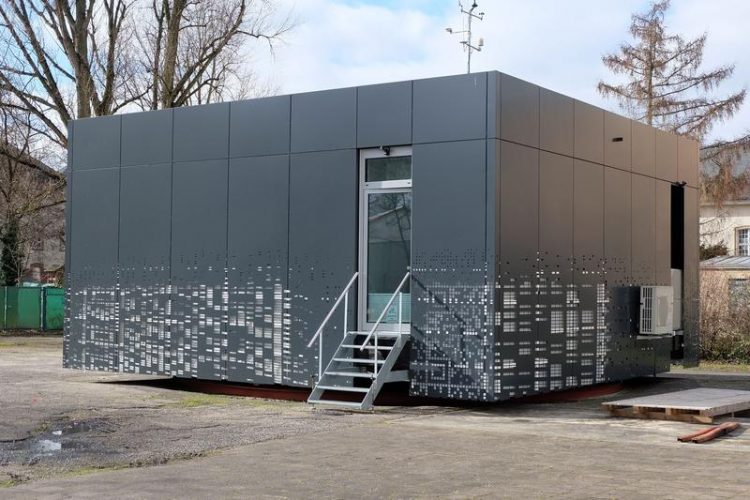Working comfortably in summer heat

Several experiments within the "Passive cooling" project have been conducted in the LOBSTER test stand at the University of Wuppertal. © Johannes Lang, BINE Informationsdienst
Improving thermal comfort in non-air-conditioned buildings
The personal perception of users affects the assessment of thermal comfort. This can vary depending on the season. For example, higher room temperatures are tolerated in summer than in winter.
It was found in tests that the test persons are more satisfied with the thermal comfort when they can influence the indoor environment themselves, for example by opening windows or individually operating the solar shading or ceiling fans. The scientists conducted field investigations in six office buildings in Karlsruhe and Stuttgart. In addition, experimental series were conducted on various test rigs.
As a result of their investigations, the researchers combined two standard comfort models – the PMV (Predictive Mean Vote) and adaptive models – to form the so-called adaptive balance model (ATHB). In addition to standard factors such as the air temperature, air velocity and floating average value of the outside temperature, this now makes it possible to take psychological or building-related factors into account (for example, the type of air-conditioning). Comfort models serve to objectively evaluate and model the degree of thermal comfort in buildings. They also form part of standards.
The “Passive cooling” project is being jointly carried by scientists at the Karlsruhe Institute of Technology (KIT) and the University of Wuppertal.
You found all informations about the BINE Projektinfo brochure entitled “Keeping a cool head in the summer heat” (04/2016) here:
http://www.bine.info/en/press/press-releases/press/pressemitteilung/bei-sommerhi…
Uwe Milles/Birgit Schneider
presse(at)bine.info
About BINE Information Service
Energy research for practical applications
The BINE Information Service reports on energy research topics, such as new materials, systems and components, as well as innovative concepts and methods. The knowledge gained is incorporated into the implementation of new technologies in practice, because first-rate information provides a basis for pioneering decisions, whether in the planning of energy-optimised buildings, increasing the efficiency of industrial processes, or integrating renewable energy sources into existing systems.
About FIZ Karlsruhe
FIZ Karlsruhe – Leibniz Institute for Information Infrastructure is a not-for-profit organization with the public mission to make sci-tech information from all over the world publicly available and to provide related services in order to support the national and international transfer of knowledge and the promotion of innovation.
Our business areas:
• STN International – the world’s leading online service for research and patent information in science and technology
• KnowEsis – innovative eScience solutions to support the process of research in all its stages, and throughout all scientific disciplines
• Databases and Information Services – Databases and science portals in mathematics, computer science, crystallography, chemistry, and energy technology
FIZ Karlsruhe is a member of the Leibniz Association (WGL) which consists of 87 German research and infrastructure institutions.
http://www.bine.info/en – BINE Informationsdienst
Media Contact
All latest news from the category: Architecture and Construction
Newest articles

Properties of new materials for microchips
… can now be measured well. Reseachers of Delft University of Technology demonstrated measuring performance properties of ultrathin silicon membranes. Making ever smaller and more powerful chips requires new ultrathin…

Floating solar’s potential
… to support sustainable development by addressing climate, water, and energy goals holistically. A new study published this week in Nature Energy raises the potential for floating solar photovoltaics (FPV)…

Skyrmions move at record speeds
… a step towards the computing of the future. An international research team led by scientists from the CNRS1 has discovered that the magnetic nanobubbles2 known as skyrmions can be…





















